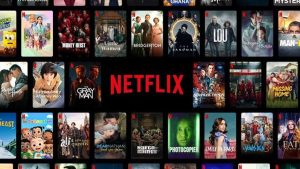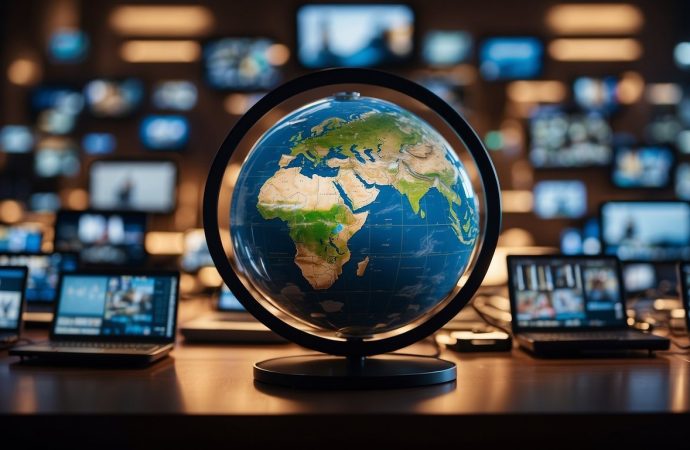Introduction Globalisation has dramatically changed how we consume, produce, and share media and entertainment. As the world becomes more interconnected, boundaries blur, creating new opportunities and challenges for the industry. This article explores how globalisation impacts the media and entertainment sector, highlighting the benefits and challenges while offering an in-depth comparative and analytical view. The
Introduction
Globalisation has dramatically changed how we consume, produce, and share media and entertainment. As the world becomes more interconnected, boundaries blur, creating new opportunities and challenges for the industry. This article explores how globalisation impacts the media and entertainment sector, highlighting the benefits and challenges while offering an in-depth comparative and analytical view.
The Rise of Globalisation in Media and Entertainment
Globalisation has grown rapidly over the past few decades, mainly due to the internet and digital technology. Today, people from different parts of the world can watch the same movies, listen to the same music, and follow the same TV shows. This rise of globalisation has opened doors for media and entertainment to reach a global audience, connecting people across borders like never before.
Key Drivers of Globalisation in Media and Entertainment

Image by: Yandex.com
1. Technology and Digital Platforms
The rise of the internet, social media, and streaming platforms like Netflix and YouTube has made content globally accessible. Technology enables instant sharing, breaking geographical barriers and connecting diverse audiences.
2. International Collaborations
Globalisation fosters collaborations between creators across countries. Co-productions, like Hollywood and Bollywood films, bring unique perspectives, increasing their appeal to global audiences.
3. Changing Consumer Preferences
Audiences today crave diverse content, often seeking international shows, movies, and music. This demand motivates producers to cater to multicultural tastes.
Benefits of Globalisation in the Industry

Image by: Yandex.com
Globalisation brings many benefits to the media and entertainment world. It allows companies to reach larger audiences, which means more viewers, listeners, and consumers. The cultural exchange between countries is also a big plus. People can learn about different cultures through films, music, and shows, making the world feel smaller and more connected. Lastly, it creates new jobs and boosts the economy by opening new markets for entertainment products.
1. Increased Market Reach
Media houses and entertainment companies now have access to global audiences. For instance, K-pop bands like BTS have massive followings worldwide, not just in South Korea.
2. Cultural Exchange
Globalisation promotes cultural sharing, helping people understand and appreciate different traditions and lifestyles through films, shows, and music.
3. Economic Growth
The expansion of media companies into new territories generates revenue and creates job opportunities, boosting the global economy.
The Impact of Technology on Global Media

Image by: Yandex.com
Technology has been one of the biggest drivers of globalisation in media and entertainment. With the rise of the internet, smartphones, and streaming platforms like Netflix, YouTube, and Spotify, people can access content anytime and from anywhere. This has made it possible for entertainment to cross borders effortlessly. For example, someone in India can easily watch a popular TV show from the United States or listen to music from Latin America. Technology makes entertainment more accessible and has changed the way we consume media.
The Influence of Global Media on Local Industries
While global media creates more opportunities, it also puts pressure on local entertainment industries. Small-scale producers might find it hard to compete with big international companies that have larger budgets and resources. Local content can struggle to stand out in a world dominated by major global players like Hollywood or Netflix. However, some local industries use this challenge as an opportunity to innovate and create content that appeals to both local and international audiences, finding unique ways to compete.
The Growth of Streaming Platforms

Image by: Yandex.com
Streaming services have played a huge role in the globalisation of media. Platforms like Netflix, Amazon Prime, and Disney+ have expanded into many countries, bringing a wide range of shows, movies, and documentaries. These services offer content from all around the world, allowing viewers to explore different genres, languages, and cultures. As a result, people are now more likely to watch foreign films or TV shows than ever before. This shift has also encouraged the creation of more diverse content to cater to global tastes.
The Expansion of Digital Platforms
With the rise of globalisation, digital platforms have become central to the way we consume media. Platforms like Netflix, Amazon Prime, and YouTube have changed how entertainment is distributed, offering content on-demand to viewers around the world. This has made it easier for people to access content from different countries, breaking down barriers that once limited access. These platforms not only provide movies and TV shows but also music, podcasts, and other forms of entertainment, creating a more diverse media landscape.
The Impact on Local Media Industries
While globalisation has opened up many opportunities, it has also put pressure on local media industries. Smaller media companies may struggle to compete with the vast resources of global giants like Netflix, Disney, and Amazon. As a result, local content creators must find innovative ways to attract audiences, often by offering unique content that reflects their culture and traditions. Some countries are even introducing regulations to ensure that local content is not lost in the global media landscape.
Changing Trends in Advertising
Globalisation has also had a significant impact on advertising in the media and entertainment industry. Advertisers are now able to reach a global audience with tailored ads, thanks to the data collected from digital platforms and social media. This has made advertising more targeted and effective. However, it also raises concerns about privacy, as personal data is often used to create customized ads. As media becomes more global, advertisers need to balance reaching wider audiences while respecting consumer privacy.
The Influence of Social Media on Global Entertainment

Image by: Yandex.com
Social media has also changed the way we discover and share entertainment. Platforms like Instagram, TikTok, and Twitter allow people to share content instantly, and this has made entertainment even more global. A viral video or a trending hashtag can make a movie, music video, or celebrity famous worldwide in a matter of hours. Social media helps content spread quickly and widely, breaking down the traditional barriers of TV schedules or movie release dates.
The Role of International Collaboration in Content Creation
Another important effect of globalisation is the increase in international collaborations. Filmmakers, musicians, and TV producers now work together across borders to create content that appeals to global audiences. For example, movies that are co-produced by companies from different countries often feature a mix of languages and actors from around the world. These collaborations bring fresh ideas, new perspectives, and higher production values, making content more interesting and appealing to a wider range of viewers.
The Spread of Global Pop Culture

Image by: Yandex.com
With globalisation, pop culture has spread far beyond its country of origin. American TV shows, music from South Korea, and Bollywood films have fans across the globe. This blending of different cultural elements has created a unique, shared global culture. For instance, K-pop has become a global phenomenon, with bands like BTS and BLACKPINK attracting millions of fans worldwide. The spread of global pop culture shows how entertainment from one part of the world can have a big impact everywhere.
Protecting Local Cultures in a Globalised World
While globalisation brings many benefits, there are concerns about the loss of local culture. As global media dominates, traditional art forms, languages, and cultural practices risk being forgotten or replaced. To protect local identities, many countries are promoting their own media industries. For example, some countries require TV stations to show a certain percentage of locally produced content. This helps keep local culture alive while still embracing the benefits of globalisation. Finding a balance between local and global influences will be key to preserving cultural diversity in the future.
Cultural Representation in Global Media

Image by: Yandex.com
One of the positive effects of globalisation is the increased representation of different cultures in media. Today, TV shows, films, and music are more likely to include diverse characters, stories, and perspectives. This is helping to create a more inclusive entertainment environment, where people from all backgrounds can see themselves reflected in the content they consume. For example, movies from different countries often include characters from various ethnicities, reflecting the diversity of the global audience.
The Rise of Global Celebrities
In the past, celebrities were often known only in their home countries. With globalisation, however, it’s now possible for individuals in the entertainment industry to gain international fame. Musicians like BTS, actors like Priyanka Chopra, and filmmakers like Bong Joon-ho are examples of global celebrities whose work has crossed borders. This has allowed artists to build large fan bases around the world, showing how media can be a powerful tool in creating international stars.
Media and the Sharing of Ideas
Globalisation has made it easier for people to share ideas through media. The internet and social media platforms have allowed people to connect, discuss, and share opinions with others from different parts of the world. This has created a global conversation around issues such as climate change, politics, and social justice. As a result, entertainment content often reflects these global discussions, influencing the topics and themes of films, TV shows, and music.
The Role of Globalisation in Shaping Social Movements
Media, powered by globalisation, has also played a role in shaping social movements. From the Arab Spring to the Black Lives Matter movement, social media has been a key tool in organizing and spreading messages globally. Entertainment, especially documentaries and news programs, has brought attention to important issues and helped spark change. This shows how globalised media can serve not just as a form of entertainment but also as a platform for activism and social change.
Challenges of Globalisation in Media and Entertainment
While globalisation has many positive effects, it also brings challenges. One big problem is that local cultures can sometimes get overshadowed by more dominant ones, especially Western media. This can lead to a loss of cultural diversity. Another challenge is piracy, as it becomes easier for people to steal and share content globally. Language barriers can also make it difficult for people to enjoy media from different countries, even with subtitles or dubbing.
1. Cultural Homogenisation
While globalisation promotes cultural exchange, it can also overshadow local traditions, making them less prominent. Western media often dominates, risking cultural diversity.
2. Piracy and Content Regulation
The global nature of media complicates content regulation and increases the risk of piracy, leading to revenue loss for creators.
3. Language Barriers
Despite technological advancements, language differences still pose challenges in reaching broader audiences. Subtitles and dubbing do not always capture cultural nuances.
The Future of Globalisation in Media and Entertainment

Image by: Yandex.com
The future of globalisation in media and entertainment looks promising, with new technologies like virtual reality and artificial intelligence set to enhance the experience. As global internet access continues to grow, more people will connect with media from different parts of the world. However, there will be a need for more efforts to protect cultural diversity, support local content, and regulate digital piracy. The future will likely see an even greater blending of global influences, creating a richer, more diverse media landscape.
Conclusion
In conclusion, globalisation has transformed the media and entertainment industry in both positive and challenging ways. It has expanded audience reach, increased cultural exchange, and provided opportunities for greater collaboration. However, it also brings challenges like the risk of losing local cultures, increased competition, and privacy concerns. As the industry continues to grow and change, the key will be finding a balance between embracing global opportunities while protecting local identities and values. The future of globalised media looks promising, with more diverse content and opportunities for both creators and audiences around the world.
















